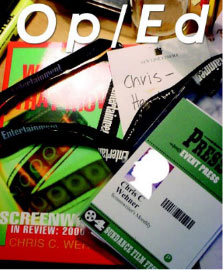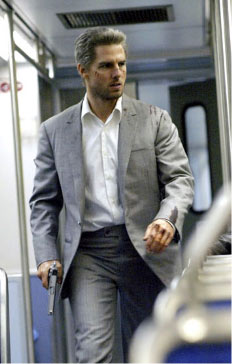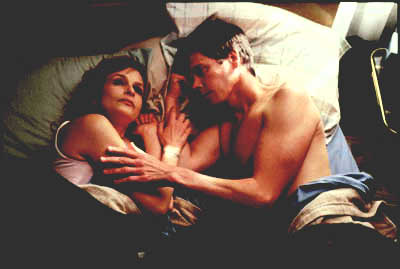
It's So Good To Be Bad
August 7th, 2004

 Making the good guy bad, or the bad guy good, and then making the audience feel sympathy for him or her is nothing new in cinema. As a matter of fact, I don’t think it’s as hard to do in your screenplay as some of you might think. If you’re considering writing a story about a dark or unhinged protagonist but are unsure if it will fly, have no fear.
Making the good guy bad, or the bad guy good, and then making the audience feel sympathy for him or her is nothing new in cinema. As a matter of fact, I don’t think it’s as hard to do in your screenplay as some of you might think. If you’re considering writing a story about a dark or unhinged protagonist but are unsure if it will fly, have no fear.
I know, not too long ago the good guys wore white hats and the bad guys black ones, it was easy to tell them apart. The Westerns of the 50s and 60s in particular told us who was good and who was bad before you even saw them do a despicable thing. That started to change with the spaghetti Westerns and Clint Eastwood, topped off with Sam Peckinpah’s The Wild Bunch in 1969. In the 1980s when Arnold, or Bruce, or Mel were on screen you knew they were the good guys.
But the last ten years or so we’ve seen a plethora of downright likeable bad guys and bad good guys. So what it really comes down to, is, that a majority of the movie going public appears to really want to like the bad guy. Are we all somehow envious of the rule breakers and rebels that we silently will root for them? Perhaps. Hollywood, to be sure, seems to think so otherwise they wouldn’t keep churning out these types of storylines and we wouldn’t keep showing up for them. I mean, we’re even making our comic book heroes dark nowadays. Look no further than the latest Spider-Man, where at one point you see our disillusioned crime fighter, our hero, turn his back on victims and refuse to help them.
One of the top movies at the box office, The Bourne Supremacy, finds Matt Damon once again playing an expert assassin and cold-blooded killer who we somehow come to like. Is it because he has amnesia and does not remember everything? He doesn’t remember what he’s done so who cares.
The trend is to play off of the audience’s built-in desire to sympathize with the good bad man, or the bad good man or mean nasty good guy or, never mind. Forever screenwriting classes have instructed students to make their characters flawed, but no one ever suggest making them killers or child molesters.

At this year’s Sundance Film Festival one of the most talked about films was The Woodsman in which Kevin Bacon gives a powerful performance as a recently released from prison pedophile who is attempting to rebuild his life. The film’s delicate yet ominous handling of an undeniable undercurrent trying to make this character sympathetic often left me nauseous.
Tom Cruise plays a hit man in the upcoming Michael Mann film Collateral. There has been talk that Cruise is finally playing a down and dirty bad guy, a killer, who rides around in a cab all night unmercifully doing hits while the cabby (played by Jamie Foxx) unwittingly drives him. Unlike his role in Minority Report, where Cruise’s supposedly dark character with faults such as drug abuse, are overshadowed by the anguish from the death of his son, thus making his character very likeable and the audience very forgiving. I haven’t read the script for Collateral or been to a press screening yet, but I’d bet you that Cruise’s first real �bad guy� is still on the self somewhere just waiting for him. Because I can’t for the life of me believe without seeing, that there will not be some emotional level in this film showing how conflicted and tormented his character is and in the end, he’ll come across sympathetic if not downright likeable.
Other recent �Likable� Good Bad guys broken down into categories:
Likable Bad Cops:
In Dark Blue Kurt Russell plays an unhinged LAPD elite Special Investigations Squad (SIS) member who is as dirty as they come, but in the end sees the error of his ways and brings down the house of cards on his superiors.
Lets not forget about Dirty Harry, a morally complex character who seems to be the father of most current cop films.
Training Day, Denzel Washington’s portrayal of perhaps the dirtiest kind of cop, a man so merciless he kills without remorse, is somehow lighten by the charm and charisma of his performance along with the writing of David Ayer and the direction of Antoine Fuqua. Even as he is gunned down at the end, and deservedly so, you couldn’t help feeling this guy was too tough to actually die.
L.A. Confidential stars a pre-super star Russell Crowe, who plays a thug of a cop who uses violence for both righteous and unrighteous means. But when we realize he is especially rude to men who abuse woman, well, everyone just melts, especially the ladies.
Likeable Drug Dealers:
Light Sleeper, Willem Dafoe plays the best kind of drug dealer, a loyal, decent, hard working pusher who suffers from insomnia. Writer-director Paul Schrader is a favorite of mine and this is one of his lesser-known films.
Carlito’s Way, another outstanding performance by Al Pacino who plays a recovering heroine dealer and murderer, who is trying to go the straight and narrow and must somehow legally collect seventy-five grand so he can retired to Florida. The interesting thing here is how De Palma tells us he is a drug dealer but never shows us this side of him. The entire film is setup to make you sympathize with this character. It’s also a first-rate film.
Midnight Express, the Oliver Stone scripted film easily shifts the audiences attention away from the crime and onto the obtuse sentence an America student receives while unwittingly caught in Turkey with hashish.
Likable Assassins and Killers
Ghost Dog, Jim Jarmusch is a fine filmmaker and this is a good film. Forest Whitaker plays a contract killer for the mob. He kills without remorse, execution style, and yet he's like a big cuddly teddy bear. You can't help but like the guy, he's seen taking care of pigeons and buying ice cream for little girls. Ah, he's not so bad.
Leon: The Professional, written and directed by Luc Besson. Leon is a contract hit man, a cold blooded killer whose abilities as a killer are frighteningly good, but yet he found the time to befriend an innocent girl whose family was murdered.
Grosse Pointe Blank, a hit man who decides to attend his 10-year high school reunion and rekindle an old love affair.
A Perfect World, the escaped con played by Kevin Costner (his best performance) is mysterious and somehow sympathetic to us as he takes a child hostage and kills without remorse. But yet, by the time Clint Eastwood hunts him down, ready to kill him, you feel anxiety for his character, almost not wanting him to meet his certain fate� at least not yet.
Assassians, Sylvester Stallone is a seasoned hitman who just wants out of the business with no back talk
Likeable Terrorists:
The Jackal, here was a can’t miss premise. Take one particularly mean and nasty terrorist (Bruce Willis) and have him take on a kindler-gentler one (Richard Gere) and see who the audience likes best.
The Crying Game, an easy choice. What a film by Neil Jordan and what a terrific from out-of-nowhere twist at the end, it’s so good you’re left astounded by the trick and completely forgetful of the nasty IRA terrorist thingy.
A Prayer for the Dying, another IRA �feel good� terrorist film. Okay, maybe it’s not that bad. The IRA is a good topic if you want to drum up sympathy from an American audience. We’re well versed in the struggles of the Irish in that part of the world.
Likeable Gangsters:
Been doing these for years haven’t they?
A Bronx Tale is about a mob boss who kills someone over a parking space but somehow by movies' end we cut him some slack, he’s not so bad.
All of the Godfather movies.
Hoffa kind of deals with the mob and it centers on a character who is a mob union boss, Jimmy Hoffa, who is a mean nasty sonofabitch and yet, implausibly, they get you to find some sick sympathy for the poor bastard.
Goodfellas, how could anyone not like the lovable gangsters in this one, huh? Our mob trio played by Ray Liotta, Robert De Niro, and Joe Pesci have no qualms hitting woman, shooting kids, turning on each other, dealing drugs, killing other mobsters over respect, and yet through the whole thing we love them for it. And in the end, when Liotta looks straight at us and tells us how pathetic we are for not living the kind of life he has, what do we do? Jeer him, throw popcorn at the screen, no, in the theater I was at years ago, we all applauded.
 Chris Wehner is a film critic for the Movie Review & Screenplay Database (www.iscriptdb.com), editor-in-chief (and publisher) of Screenwriters Monthly, author of Screenwriting on the Internet: Researching, Writing, & Selling Your Script on the Web (2000) and Who Wrote That Move? Screenwriting in Review: 2000-2002 (2003), script reviewer, and founder of ScreenwritersUtopia.com. He is also Vice President of Development for MoviePartners, Inc. He is currently developing (and writing) several projects for various companies. He has been involved with screenwriting for nearly 10 years and in many different capacities.
Chris Wehner is a film critic for the Movie Review & Screenplay Database (www.iscriptdb.com), editor-in-chief (and publisher) of Screenwriters Monthly, author of Screenwriting on the Internet: Researching, Writing, & Selling Your Script on the Web (2000) and Who Wrote That Move? Screenwriting in Review: 2000-2002 (2003), script reviewer, and founder of ScreenwritersUtopia.com. He is also Vice President of Development for MoviePartners, Inc. He is currently developing (and writing) several projects for various companies. He has been involved with screenwriting for nearly 10 years and in many different capacities.
Only logged-in members can comment. You can log in or join today for free!
No comments posted.
Advertisement

















